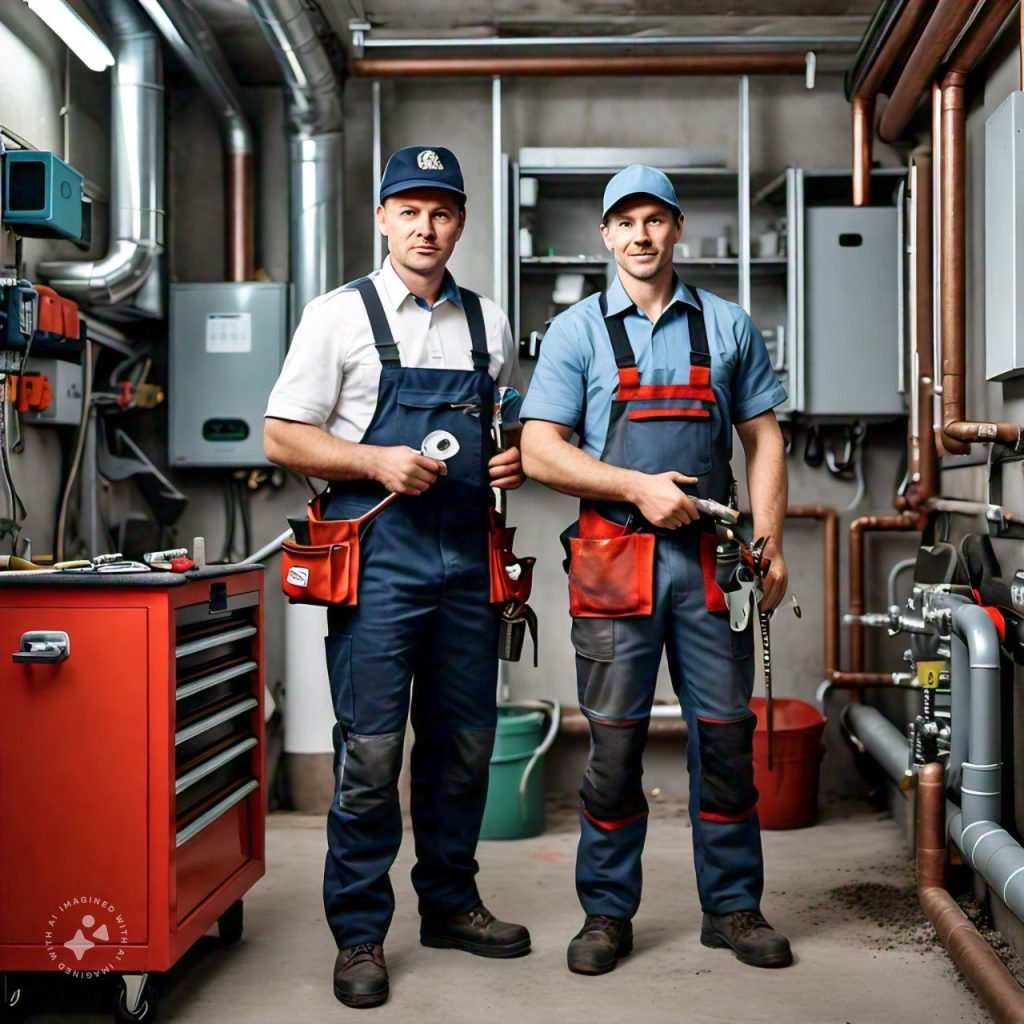When it comes to maintaining and repairing the vital systems that ensure our homes and businesses are comfortable and functional, two professionals often come into play: heating engineers and plumbers. While these roles may seem similar to the untrained eye, they have distinct responsibilities, areas of expertise, and training. This article delves into the differences between heating engineers and plumbers, exploring their qualifications, job responsibilities, areas of specialization, and when you might need each one.
Table of Contents
ToggleUnderstanding the Roles
Heating Engineer
A heating engineer is a professional specialized in the installation, maintenance, and repair of heating systems. These systems can include boilers, central heating systems, radiators, underfloor heating, and heat pumps. Heating engineers are experts in ensuring that heating systems operate efficiently and safely.
Qualifications and Training: Heating engineers often undergo extensive training and apprenticeships to gain the necessary skills. They typically need to obtain certifications, such as Gas Safe registration in the UK or equivalent qualifications in other countries, to legally work on gas appliances. Their training covers various aspects of heating systems, including combustion analysis, system design, and safety regulations.
Areas of Expertise:
- Installation of heating systems
- Boiler servicing and repairs
- Radiator installation and maintenance
- Underfloor heating systems
- Heat pump systems
- System diagnostics and troubleshooting
Plumber
A plumber is a tradesperson who specializes in installing, maintaining, and repairing plumbing systems. These systems include water supply lines, drainage systems, and sanitary fixtures like sinks, toilets, and showers. Plumbers ensure that water flows efficiently and safely through the building’s plumbing infrastructure.
Qualifications and Training: Plumbers also undergo rigorous training and apprenticeships, often gaining certifications from recognized institutions. Their training includes understanding water supply regulations, piping systems, and sanitary installations. In some regions, plumbers may also be required to have licenses to practice their trade.
Areas of Expertise:
- Installation and repair of water supply lines
- Drainage and sewage systems
- Installation of fixtures like sinks, toilets, and showers
- Pipework for residential and commercial buildings
- Leak detection and repair
- Plumbing system diagnostics and maintenance
Key Differences Between Heating Engineers and Plumbers
While there is some overlap in the skills and tasks that heating engineers and plumbers can perform, several key differences distinguish these professions.
1. Focus of Work
Heating Engineers:
- Primarily focused on heating systems.
- Expertise in boilers, radiators, underfloor heating, and heat pumps.
- Specialized knowledge in energy efficiency and system optimization.
Plumbers:
- Focused on the broader plumbing system.
- Expertise in water supply, drainage, and sanitary systems.
- Handle a wide range of plumbing issues, from leaky faucets to complex pipework installations.
2. Training and Certifications
Heating Engineers:
- Often require specific certifications related to heating systems (e.g., Gas Safe registration).
- Training includes detailed knowledge of heating system components, combustion processes, and safety protocols.
Plumbers:
- Require certifications related to plumbing systems.
- Training encompasses a wide range of plumbing-related topics, including water supply regulations, pipework, and fixture installation.
3. Types of Services Offered
Heating Engineers:
- Installation and maintenance of heating systems.
- Boiler servicing and repair.
- Radiator and underfloor heating installation.
- System diagnostics and optimization for energy efficiency.
Plumbers:
- Installation and repair of plumbing fixtures and pipes.
- Drainage and sewage system maintenance.
- Leak detection and repair.
- Installation of water supply lines and sanitary systems.
When to Call a Heating Engineer
Knowing when to call a heating engineer can save time and ensure that the problem is addressed by a specialist. Here are some scenarios where you should consider contacting a heating engineer:
1. Boiler Issues
If your boiler is malfunctioning, making strange noises, or not providing hot water or heating, it’s best to call a heating engineer. They have the expertise to diagnose and repair boiler issues safely and effectively.
2. Radiator Problems
If your radiators are not heating up properly, have cold spots, or need to be installed or replaced, a heating engineer can provide the necessary services to ensure optimal performance.
3. Underfloor Heating Installation and Maintenance
Underfloor heating systems require specialized knowledge for installation and maintenance. Heating engineers can design, install, and service these systems to ensure they operate efficiently.
4. Heat Pump Installation
Heat pumps are complex systems that require expert installation and maintenance. Heating engineers are trained to handle these systems, ensuring they are set up correctly and function efficiently.
When to Call a Plumber
Plumbers are essential for maintaining and repairing the broader plumbing system in your home or business. Here are some situations where you should contact a plumber:
1. Leaky Pipes
If you notice water leaks or damp spots, a plumber can locate and repair the source of the leak to prevent further damage and water wastage.
2. Blocked Drains
Blocked drains can cause significant inconvenience and potential damage. Plumbers have the tools and expertise to clear blockages and ensure proper drainage.
3. Fixture Installation
Whether you’re renovating your bathroom or kitchen, plumbers can install sinks, toilets, showers, and other fixtures, ensuring they are connected correctly to the plumbing system.
4. Water Supply Issues
If you experience low water pressure, discolored water, or other water supply problems, a plumber can diagnose and resolve the issue to restore proper water flow.
Overlapping Skills and Collaboration
While heating engineers and plumbers have distinct areas of expertise, there are scenarios where their skills overlap, and they may collaborate on projects. For example:
1. New Building Installations
In new building projects, heating engineers and plumbers often work together to design and install the plumbing and heating systems. This collaboration ensures that both systems are integrated seamlessly and function efficiently.
2. Major Renovations
During major renovations, both heating engineers and plumbers may be required to update or relocate plumbing and heating systems. Coordinating their efforts ensures that the systems are installed correctly and comply with regulations.
3. Emergency Repairs
In emergency situations, such as a burst pipe that affects both the plumbing and heating systems, both professionals may be needed to address the issue promptly and effectively.
Choosing the Right Professional
Choosing the right professional for your needs involves understanding the specific issue and matching it with the expertise required. Here are some tips for making the right choice:
1. Identify the Issue
Determine whether the problem is related to the heating system (e.g., boiler, radiator) or the broader plumbing system (e.g., pipes, fixtures). This will help you decide whether to call a heating engineer or a plumber.
2. Check Qualifications
Ensure that the professional you hire has the necessary qualifications and certifications. For heating engineers, this may include Gas Safe registration. For plumbers, check for relevant certifications and licenses.
3. Read Reviews and Ask for Recommendations
Reading reviews and asking for recommendations from friends, family, or neighbors can help you find a reliable and reputable professional. Look for professionals with a track record of quality work and customer satisfaction.
4. Get Multiple Quotes
For larger projects, it’s a good idea to get quotes from multiple professionals. This allows you to compare prices, services, and timelines, helping you make an informed decision.
Conclusion
Understanding the differences between heating engineers and plumbers is essential for ensuring that you hire the right professional for your needs. Heating engineers specialize in the installation, maintenance, and repair of heating systems, while plumbers focus on the broader plumbing system, including water supply, drainage, and fixtures.
By recognizing their distinct roles, training, and areas of expertise, you can make informed decisions and ensure that your home or business’s plumbing and heating systems are maintained efficiently and effectively. Whether you’re facing a boiler issue, a leaky pipe, or a blocked drain, knowing which professional to call can save time, money, and hassle, ensuring that your systems are back up and running smoothly.

